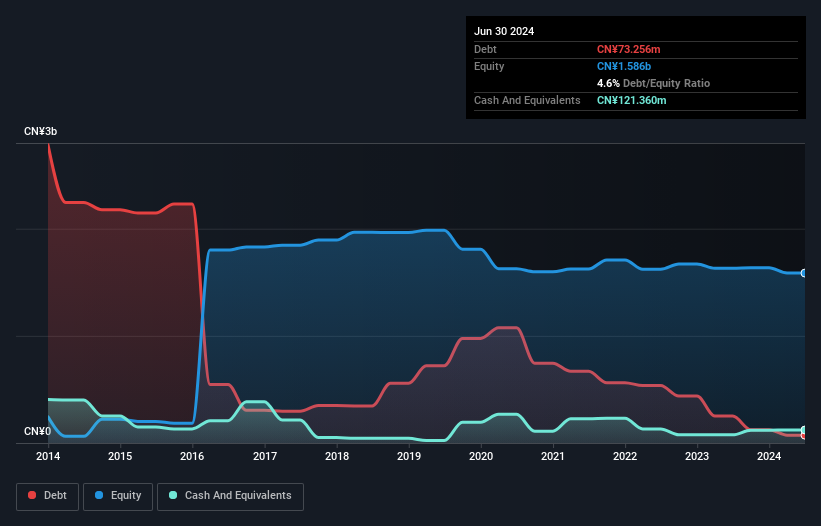The external fund manager backed by Berkshire Hathaway's Charlie Munger, Li Lu, makes no bones about it when he says 'The biggest investment risk is not the volatility of prices, but whether you will suffer a permanent loss of capital.' When we think about how risky a company is, we always like to look at its use of debt, since debt overload can lead to ruin. We can see that Talent Property Group Limited (HKG:760) does use debt in its business. But the real question is whether this debt is making the company risky.
Why Does Debt Bring Risk?
Generally speaking, debt only becomes a real problem when a company can't easily pay it off, either by raising capital or with its own cash flow. In the worst case scenario, a company can go bankrupt if it cannot pay its creditors. However, a more common (but still painful) scenario is that it has to raise new equity capital at a low price, thus permanently diluting shareholders. Having said that, the most common situation is where a company manages its debt reasonably well - and to its own advantage. The first thing to do when considering how much debt a business uses is to look at its cash and debt together.
See our latest analysis for Talent Property Group
How Much Debt Does Talent Property Group Carry?
As you can see below, Talent Property Group had CN¥73.3m of debt at June 2024, down from CN¥251.7m a year prior. However, its balance sheet shows it holds CN¥121.4m in cash, so it actually has CN¥48.1m net cash.

How Healthy Is Talent Property Group's Balance Sheet?
Zooming in on the latest balance sheet data, we can see that Talent Property Group had liabilities of CN¥1.13b due within 12 months and liabilities of CN¥207.9m due beyond that. Offsetting these obligations, it had cash of CN¥121.4m as well as receivables valued at CN¥51.7m due within 12 months. So it has liabilities totalling CN¥1.16b more than its cash and near-term receivables, combined.
The deficiency here weighs heavily on the CN¥82.6m company itself, as if a child were struggling under the weight of an enormous back-pack full of books, his sports gear, and a trumpet. So we definitely think shareholders need to watch this one closely. At the end of the day, Talent Property Group would probably need a major re-capitalization if its creditors were to demand repayment. Given that Talent Property Group has more cash than debt, we're pretty confident it can handle its debt, despite the fact that it has a lot of liabilities in total.
In fact Talent Property Group's saving grace is its low debt levels, because its EBIT has tanked 44% in the last twelve months. Falling earnings (if the trend continues) could eventually make even modest debt quite risky. When analysing debt levels, the balance sheet is the obvious place to start. But it is Talent Property Group's earnings that will influence how the balance sheet holds up in the future. So if you're keen to discover more about its earnings, it might be worth checking out this graph of its long term earnings trend.
But our final consideration is also important, because a company cannot pay debt with paper profits; it needs cold hard cash. While Talent Property Group has net cash on its balance sheet, it's still worth taking a look at its ability to convert earnings before interest and tax (EBIT) to free cash flow, to help us understand how quickly it is building (or eroding) that cash balance. During the last three years, Talent Property Group generated free cash flow amounting to a very robust 85% of its EBIT, more than we'd expect. That puts it in a very strong position to pay down debt.
Summing Up
Although Talent Property Group's balance sheet isn't particularly strong, due to the total liabilities, it is clearly positive to see that it has net cash of CN¥48.1m. And it impressed us with free cash flow of CN¥34m, being 85% of its EBIT. Despite the cash, we do find Talent Property Group's level of total liabilities concerning, so we're not particularly comfortable with the stock. There's no doubt that we learn most about debt from the balance sheet. But ultimately, every company can contain risks that exist outside of the balance sheet. We've identified 2 warning signs with Talent Property Group (at least 1 which is significant) , and understanding them should be part of your investment process.
When all is said and done, sometimes its easier to focus on companies that don't even need debt. Readers can access a list of growth stocks with zero net debt 100% free, right now.
Valuation is complex, but we're here to simplify it.
Discover if Talent Property Group might be undervalued or overvalued with our detailed analysis, featuring fair value estimates, potential risks, dividends, insider trades, and its financial condition.
Access Free AnalysisHave feedback on this article? Concerned about the content? Get in touch with us directly. Alternatively, email editorial-team (at) simplywallst.com.
This article by Simply Wall St is general in nature. We provide commentary based on historical data and analyst forecasts only using an unbiased methodology and our articles are not intended to be financial advice. It does not constitute a recommendation to buy or sell any stock, and does not take account of your objectives, or your financial situation. We aim to bring you long-term focused analysis driven by fundamental data. Note that our analysis may not factor in the latest price-sensitive company announcements or qualitative material. Simply Wall St has no position in any stocks mentioned.
About SEHK:760
Talent Property Group
An investment holding company, invests in, develops, and manages real estate properties in the People’s Republic of China.
Flawless balance sheet and slightly overvalued.
Market Insights
Community Narratives



